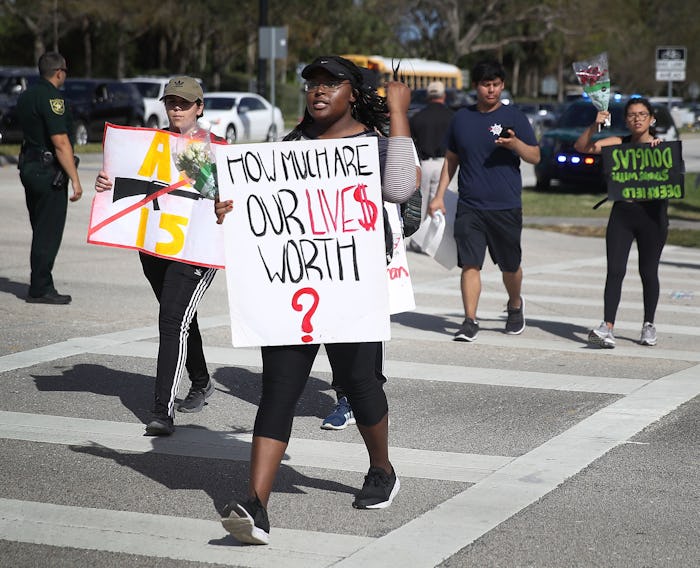Life

Here's What Could Happen To Students Participating In The National School Walkout
At 10 a.m. on Wednesday, March 14, students in schools across the country will leave class and march in protest of gun violence in the wake of the mass shooting at Marjorie Stoneman Douglas High School in Parkland, Florida, one month ago that left 17 innocent people dead. It's only the latest in the growing movement of inspiring student-led activism against gun violence — activism that participants and allies are hoping will lead to long-overdue and much-needed legislative change. But amid reports that some schools have threatened to punish students for joining the march, parents and teens alike are left wondering, can students get in trouble for participating in the National School Walkout? Anyone ready to participate should ensure they are fully aware of their protest rights (yes, teens have them too!), but it's also just as important that they're aware of any potential implications.
In general, Americans have the right to peaceful assembly under the First Amendment, but when you're a student, the rules aren't as straightforward as they would be for the average American adult taking part in the Women's March, for example. For one, the fact that school attendance is compulsory means that students can be punished for leaving class, regardless of the reason, according to the American Civil Liberties Union (ACLU).
That makes things tricky for students who want to support the walkout, though. As the Parkland shooting made so devastatingly clear, students are the ones who are literally being killed by inaction over gun violence, yet facing disciplinary action over school absences is also a concern, especially if it could affect their college applications. The good news at least, according to the ACLU, is that schools don't have the right to punish students for participating in the walkout specifically — all schools can do is enact the usual consequences for missing class in general. In other words? Before leaving the classroom on Wednesday, students should be aware of their school's policy regarding unauthorized absences, and make sure they're ready to accept it if they opt to leave.
Another aspect of the student protest gray area is that, on the flip side, the walkout itself is actually a pretty valuable learning opportunity for students to become engaged and aware of their constitutional rights, and with politics in general. As human rights lawyer and coordinator of the Youth Free Expression Program for the National Coalition Against Censorship Abena Hutchful explained in an article for Huffington Post, "the walkouts present an opportunity for students to express their frustration in a way that inspires actual change," as well as "a chance for students to model responsible citizenship," and really, participation is actually something teachers and schools should encourage. In that sense, the educational value itself means that walking out of school isn't exactly the same as if they were walking off the job, for example. And some schools, at least, are recognizing that.
At Mooresville High School in Mooresville, Indiana, for one, school administrators have actually opted to work with student leaders to support the protest, according to the Associated Press, and a number of colleges, including Harvard, Yale, MIT, the University of Connecticut, and UCLA, among others, have said they won't hold protest participation against anyone who applies. Other schools, according to CNN, have signaled that they will likely only enforce rules against students whose protest participation becomes disruptive, or if it interferes with the functioning of the school (which is one of the limits placed on student protest, according to the ACLU).
Unfortunately, there are also some schools who have carried out disciplinary action against students — or who are threatening to do so on Wednesday — even though it infringes upon the students' rights. In Needville, Texas, school superintendent Curtis Rhodes reportedly threatened students in a since-deleted Facebook post with a three-day suspension for participating in a school walkout, according to CNN, even if they had parental permission. After a planned Feb. 27 walkout at Ingleside Middle School in Arizona, students who chose to participate and leave campus were given one-day suspensions, according to the Associated Press, and ahead of Wednesday's walkout, a school superintendent in Waukesha, Wisconsin, also sent a letter out to parents claiming that "participation in a walkout is disruptive and against school regulations, and will subject students to disciplinary measures," according to CNN. (In a follow-up letter, however, Superintendent Todd Gray clarified that "individuals have a right to demonstrate," and that parents also had the right to excuse their children from school in order to do so).
The takeaway, then, for parents and students? If you're under 18, it's entirely possible that leaving the classroom to participate in the walkout, or any other political demonstration, could mean you may face the same kind of consequences any student would face for generally being absent. Legally though, the school can't take much more action beyond that unless a student's participation is specifically disruptive, though at the same time, there is also no guarantee that administrators might not at least try.
Ideally, of course, schools and teachers would support students who choose to participate, and to exercise their First Amendment rights, especially for such an important, potentially-life-or-death reason. But either way, experts seem to agree that the best course of action for students is to know their rights as well as the possible consequences, and make sure they're comfortable taking the risk before they decide to leave class.
Check out Romper's new video series, Bearing The Motherload, where disagreeing parents from different sides of an issue sit down with a mediator and talk about how to support (and not judge) each other’s parenting perspectives. New episodes air Mondays on Facebook.